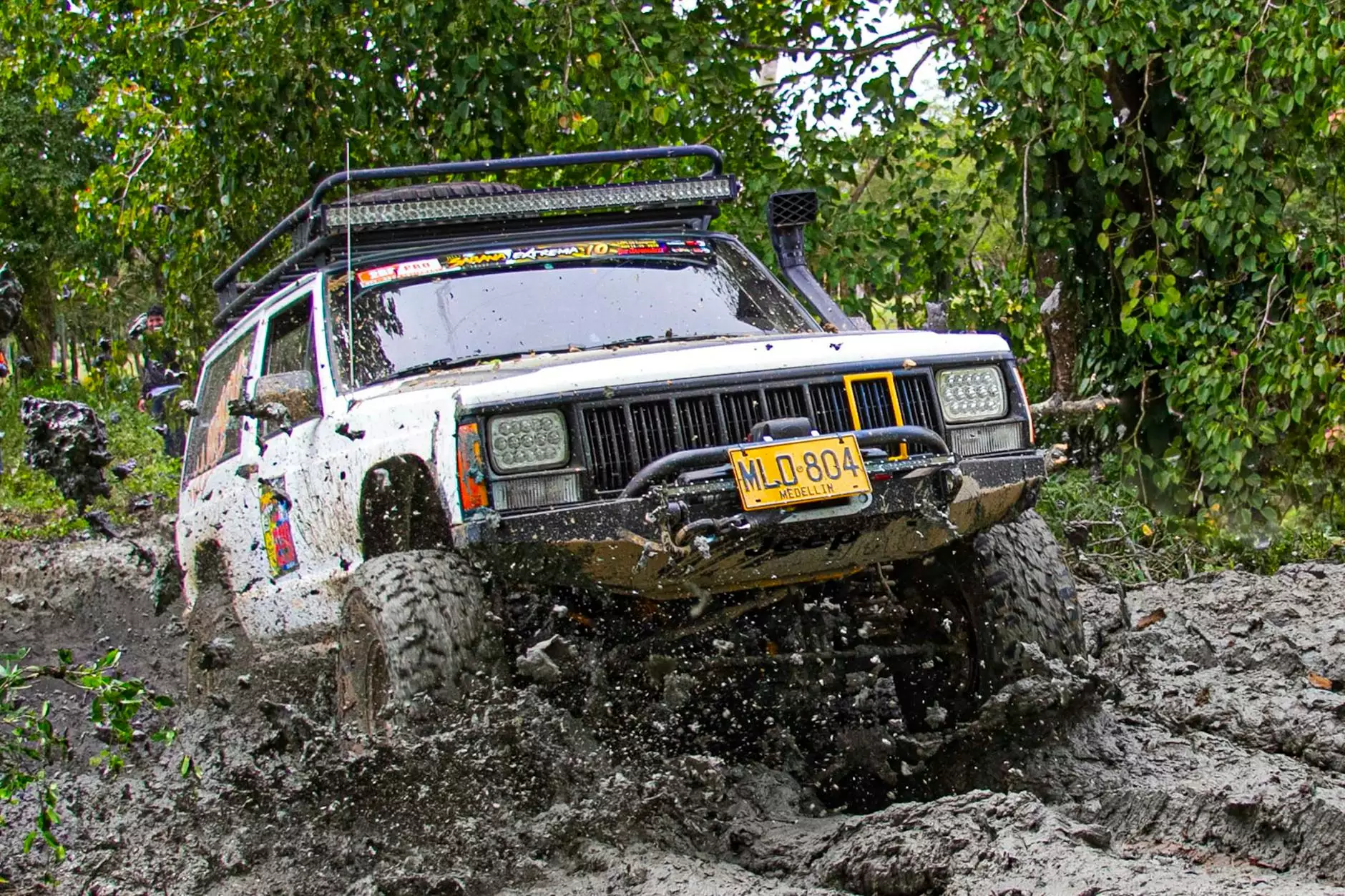Ultimate Guide to Jeep Wheels and Tires

If you're a passionate off-roader or simply enjoy navigating rugged terrains, understanding the importance of Jeep wheels and tires is crucial. Your Jeep's wheels and tires significantly impact its performance, handling, and overall driving experience. In this comprehensive guide, we will explore everything you need to know about selecting, installing, and maintaining Jeep wheels and tires for optimal performance.
Why Choosing the Right Wheels and Tires Matters
When it comes to off-roading, your Jeep's wheels and tires are your first line of defense against rough terrains. The right combination can enhance traction, stability, and control, allowing you to tackle any adventure with confidence. Here are some reasons why it's essential to choose the right wheels and tires:
- Traction: Proper tires provide superior grip on diverse surfaces, including mud, sand, and gravel.
- Stability: The right wheel size and design contribute to better vehicular stability, especially on inclines or uneven surfaces.
- Durability: Off-road tires are designed to withstand harsh conditions, preventing frequent replacements.
- Performance: Wheels and tires that complement your Jeep’s specifications optimize handling and acceleration.
Understanding Jeep Wheels
Before diving into tire selection, let's first understand the various aspects of Jeep wheels that can affect your off-roading experience.
Wheel Sizes and Types
Jeep wheels come in different sizes and types, each suited for specific driving conditions:
- Steel Wheels: Durable and cost-effective, steel wheels are perfect for off-roading and can endure rough treatment.
- Aluminum Alloy Wheels: Lighter than steel, alloy wheels enhance performance and are often more aesthetically pleasing.
- Beadlock Wheels: These allow for lower tire pressure, increasing traction and performance on difficult terrains.
Wheel Offset and Backspacing
Understanding wheel offset and backspacing is vital for maintaining your Jeep’s handling and stability. Wheel offset refers to the distance between the wheel's centerline and the mounting surface, while backspacing measures the distance from the back of the wheel to the mounting surface.
- Positive Offset: The mounting surface is closer to the outside, which can improve steering responsiveness.
- Negative Offset: The mounting surface is closer to the inside, providing a wider stance which is beneficial for off-roading.
- Backspacing: Too little backspacing may cause tires to rub against suspension components, while too much can negatively affect handling.
Exploring Jeep Tires
The Importance of Choosing the Right Tires
Your tires are your connection to the ground. Selecting the right type of tire can drastically improve your Jeep’s performance on and off the road. Here are some essential factors to consider when choosing Jeep tires:
- Tread Pattern: The tread design affects traction. All-terrain tires offer versatility, while mud tires excel in wet and soft conditions.
- Width and Aspect Ratio: Wider tires can provide better traction in soft conditions, while a lower aspect ratio enhances handling on pavement.
- Mud Terrain vs. All-Terrain: Mud tires have deep treads for off-roading, while all-terrain tires provide a balance between on-road comfort and off-road capability.
Leading Brands for Jeep Wheels and Tires
When it comes to performance, several top brands are renowned for their high-quality wheels and tires. Here’s a list of some brands that stand out:
- BFGoodrich: Known for their all-terrain and mud terrain tires, they provide excellent traction and durability.
- Goodyear: Offers a wide range of tire options, including the popular Wrangler series designed specifically for off-road performance.
- Cooper Tires: Known for affordability and high-quality performance, especially in off-road conditions.
- Hankook: Delivering innovative designs and excellent traction, Hankook is a favorite among off-road enthusiasts.
- Mickey Thompson: Specializes in performance tires that are built for rugged terrains.
Installing Jeep Wheels and Tires
Professional Vs. DIY Installation
While installing Jeep wheels and tires can be a DIY project, professional installation ensures safety and optimal performance. Here’s a simple breakdown:
- Professional Installation: Provides the expertise necessary to balance and align your tires correctly.
- DIY Installation: Cost-effective but requires you to have the right tools and knowledge to avoid misalignment issues.
Steps to Install Jeep Wheels and Tires
If you choose to undertake the installation yourself, follow these steps:
- Gather Necessary Tools: You will need a jack, jack stands, a lug wrench, and torque wrench for proper installation.
- Lift the Jeep: Use the jack to lift the vehicle and secure it with jack stands.
- Remove Old Wheels: Loosen and remove the lug nuts to take off the old wheels.
- Install New Tires: Position the new tires onto the wheel hub and hand-tighten the lug nuts.
- Tighten Lug Nuts: Use a torque wrench to tighten the lug nuts to the manufacturer’s specifications.
Maintaining Your Jeep Wheels and Tires
Regular Inspections
Regular inspections of your Jeep wheels and tires can greatly extend their life. Here are some maintenance tips:
- Inspect Tread Depth: Regularly check the tread depth to ensure it’s within safe limits. The penny test can be helpful.
- Check Tire Pressure: Maintaining the correct tire pressure is crucial for safety and performance.
- Look for Damage: Regularly inspect for cuts, punctures, or bulges in the tires.
- Rotate Tires: Rotating your tires every 5,000 to 7,500 miles helps them wear evenly.
When to Replace Tires
Knowing when to replace your tires is vital for safety:
- Tread Wear: If the tread is worn down to 2/32nds of an inch, it's time for a replacement.
- Age of Tires: Even if they appear visually healthy, tires older than six years should be inspected closely for signs of deterioration.
- Visible Damage: Any cuts, punctures, or bulges indicate a need for replacement.
Navigating Off-Roading with Your Jeep
With the right Jeep wheels and tires, you can take on off-road adventures confidently. Here are some tips for adventurous Jeep enthusiasts:
- Know Your Terrain: Understand the type of terrain you'll be navigating—this influences your choice of tires.
- Check Tire Pressure: Adjusting tire pressure can maximize traction on various types of terrain.
- Practice Safe Off-Roading: Always safety-first, and know your vehicle's limits.
- Join Off-Road Communities: Engaging with fellow enthusiasts can offer valuable tips and advice.
Conclusion
Investing in the right Jeep wheels and tires is not just a choice; it’s a necessity for any serious off-roading enthusiast. Understanding the specifications, maintaining your tires, and knowing when to replace them ensures a safe and thrilling adventure. At Offroad Zone, we are committed to providing you with quality products and expert advice for all your off-roading needs. Equip your Jeep today and hit the trails with confidence!









